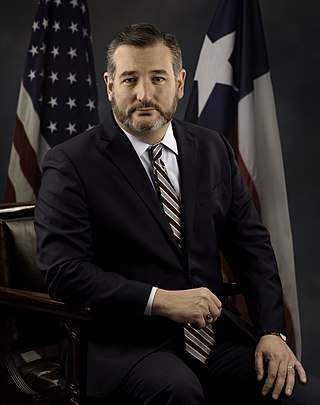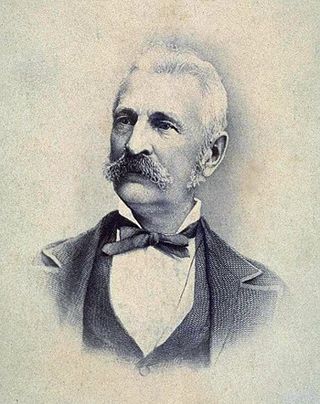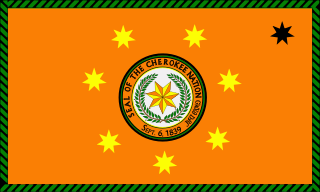Related Research Articles

The Indian Reorganization Act (IRA) of June 18, 1934, or the Wheeler–Howard Act, was U.S. federal legislation that dealt with the status of American Indians in the United States. It was the centerpiece of what has been often called the "Indian New Deal".

The Native American Graves Protection and Repatriation Act (NAGPRA), Pub. L. 101-601, 25 U.S.C. 3001 et seq., 104 Stat. 3048, is a United States federal law enacted on November 16, 1990.

Tribal sovereignty in the United States is the concept of the inherent authority of Indigenous tribes to govern themselves within the borders of the United States.

Chadwick "Corntassel" Smith is a Native American politician and attorney who served as Principal Chief of the Cherokee Nation. He was first elected in 1999. Smith was re-elected to a second term as Chief in 2003 and a third term in June 2007 with 59% of the vote. He was defeated in his attempt to get elected to a fourth term in office by Bill John Baker 54% to 46% in the 2011 election and he lost again to Baker in 2015, receiving 28% of the vote. Prior to being elected Principal Chief, he worked as a lawyer for the tribe and in private practice.

The United Keetoowah Band of Cherokee Indians in Oklahoma is a federally recognized tribe of Cherokee Native Americans headquartered in Tahlequah, Oklahoma. According to the UKB website, its members are mostly descendants of "Old Settlers" or "Western Cherokees," those Cherokees who migrated from the Southeast to present-day Arkansas and Oklahoma around 1817. Some reports estimate that Old Settlers began migrating west by 1800, before the forced relocation of Cherokees by the United States in the late 1830s under the Indian Removal Act.

The Choctaw Nation of Oklahoma is a Native American reservation occupying portions of southeastern Oklahoma in the United States. At roughly 6,952,960 acres, it is the second-largest reservation in area after the Navajo, exceeding that of eight U.S. states. The seat of government is located in Durant, Oklahoma.

Rafael Edward Cruz is an American politician, attorney, and political commentator serving as the junior United States senator from Texas since 2013. A member of the Republican Party, Cruz was the solicitor general of Texas from 2003 to 2008.

Serranus Clinton Hastings was an American politician, rancher and lawyer in California. He studied law as a young man and moved to the Iowa District in 1837 to open a law office. Iowa became a territory a year later, and he was elected a member of the House of Representatives of the Iowa Territorial General Assembly. When the territory became the state of Iowa in 1846, he won an election to represent the state in the United States House of Representatives. After his term ended, he became Chief Justice of the Iowa Supreme Court.

The Cherokee Nation, formerly known as the Cherokee Nation of Oklahoma, is the largest of three federally recognized tribes of Cherokees in the United States. It includes people descended from members of the Old Cherokee Nation who relocated, due to increasing pressure, from the Southeast to Indian Territory and Cherokees who were forced to relocate on the Trail of Tears. The tribe also includes descendants of Cherokee Freedmen, Absentee Shawnee, and Natchez Nation. As of 2023, over 450,000 people were enrolled in the Cherokee Nation.

The University of Tulsa College of Law is the law school of the private University of Tulsa in Tulsa, Oklahoma. For 2023, U.S. News & World Report ranked the University of Tulsa College of Law at No. 111 among all law schools in the United States. It is the only law school in the Tulsa Metropolitan Area and northeastern Oklahoma.
Status as a natural-born citizen of the United States is one of the eligibility requirements established in the United States Constitution for holding the office of president or vice president. This requirement was intended to protect the nation from foreign influence.

The Little Traverse Bay Bands of Odawa Indians is a federally recognized Native American tribe of Odawa. A large percentage of the more than 4000 tribal members continue to reside within the tribe's traditional homelands on the northwestern shores of the state of Michigan's Lower Peninsula. The historically delineated reservation area, located at 45°21′12″N84°58′41″W, encompasses approximately 336 square miles (870 km2) of land in Charlevoix and Emmet counties. The largest communities within the reservation boundaries are Harbor Springs, where the tribal offices are located; Petoskey, where the Tribe operates the Odawa Casino Resort; and Charlevoix.

The Muscogee Nation, or Muscogee (Creek) Nation, is a federally recognized Native American tribe based in the U.S. state of Oklahoma. The nation descends from the historic Muscogee Confederacy, a large group of indigenous peoples of the Southeastern Woodlands. Official languages include Muscogee, Yuchi, Natchez, Alabama, and Koasati, with Muscogee retaining the largest number of speakers. They commonly refer to themselves as Este Mvskokvlke. Historically, they were often referred to by European Americans as one of the Five Civilized Tribes of the American Southeast.

Peter MacDonald is a Native American politician and the only four term Chairman of the Navajo Nation. MacDonald was born in Arizona, U.S. and served the U.S. Marine Corps in World War II as a Navajo Code Talker. He was first elected Navajo Tribal Chairman in 1970.

Kevin K. Washburn is an American law professor, former dean of the University of New Mexico School of Law, and current Dean of the University of Iowa College of Law. He served in the administration of President Barack Obama as Assistant Secretary for Indian Affairs at the U.S. Department of the Interior from 2012 to 2016. Washburn has also been a federal prosecutor, a trial attorney at the U.S. Department of Justice, and the General Counsel of the National Indian Gaming Commission. Washburn is a member of the Chickasaw Nation of Oklahoma, a federally-recognized Native American tribe.

Meskwakiinaki, also called the Meskwaki Settlement, is an unincorporated community in Tama County, Iowa, United States, west of Tama. It encompasses the lands of the Meskwaki Nation, one of three Sac and Fox tribes in the United States. The others are located in Oklahoma and Kansas. The settlement is located in the historic territory of the Meskwaki (Fox), an Algonquian people. Meskwaki people established the settlement in 1857 by privately repurchasing a small part of the land they had lost in the Sac and Fox treaty of 1842.
Melissa L. Tatum is research professor of law and former director of the Indigenous Peoples Law and Policy Program at the University of Arizona's James E. Rogers College of Law. She previously served as professor of law and co-director of the Native American Law Center at the University of Tulsa College of Law.
Bryan v. Itasca County, 426 U.S. 373 (1976), was a case in which the Supreme Court of the United States held that a state did not have the right to assess a tax on the property of a Native American (Indian) living on tribal land absent a specific Congressional grant of authority to do so.
The following outline is provided as an overview of and topical guide to United States federal Indian law and policy:
References
- ↑ University of Iowa Law Library biography of Robert N. Clinton.
- 1 2 "Office of Robert N. Clinton" . Retrieved 2023-03-13.
- ↑ "Ted Cruz Isn't a 'Natural Born' Citizen", U.S. News & World Report (January 27, 2016).
- ↑ "Photography by CyberShutterbug – Another View of the World as Seen by Robert N. Clinton". Photography by CyberShutterbug. Retrieved 2017-09-07.